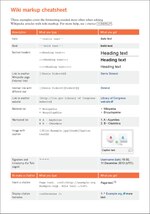Wikipedia:Quick tutorial (historical)
| This page is currently inactive and is retained for historical reference. Either the page is no longer relevant or consensus on its purpose has become unclear. To revive discussion, seek broader input via a forum such as the village pump. |
However, you should know how to edit Wikipedia. This guide will teach you how in 10 minutes.
I: Edit
Wikipedia editing is easy; you don't even have to be a registered user (although you may want to register). There are three steps:
Step I: Click the Edit tab
On the article you wish to edit, click the Edit tab on the top-right corner. Note that some articles may only be editable by established registered users, but you can edit the vast majority of articles.
Step II: Make your edits

After clicking the tab, you will be directed to a page that allows you to change the content of the page. Before the implementation of VisualEditor, editors had to deal with complex syntax, but now, you will be redirected to a WYSIWYG (what you see is what you get) editor similar to a word processor. Formatting, heading, and linking are available at the top of the editing interface.
However, since VisualEditor isn't available on talk pages (more on that later), you may want to learn basic formatting:
| Formatting | You get |
|---|---|
'''Bold text''' |
Bold text |
''Italic text'' |
Italic text |
[http://example.com Example] |
Example |
[[Nature (journal)|''Nature'']] |
Nature |
[[File:Example.jpg|thumbnail|caption]] |
|
<ref>Example footnote</ref> |
[1] |
Step III: Save
Once you are finished, click Show preview to see what the changes would look like, enter a descriptive edit summary, then click Save page.
Be bold! Don't be afraid to save, and don't agonize about making mistakes; edits can be undone at any time. If your edits are later undone, discuss with the editor who reverted it. Edit warring (basically an "undo war") is detrimental to consensus-building.
II: Discuss
You know how to edit articles, but how about discussing edits with other Wikipedians? Wikipedia facilitates such discussions using article talk pages (for discussing individual articles) and user talk pages (for contacting users). On the top of an article of user, click Talk to be directed to the corresponding talk page. Add new comments by editing a section directly (there is a Edit section link for every section), start a new discussion by clicking New section on the top of the page. Reply to discussions by indenting; one colon per indent at the beginning of a comment:
- : One
- :: Two
- ::: Three
- :: Two
Remember to sign your comments; add ~~~~ to the end of every comment.
III: Keep in mind
On Wikipedia, editors must respect policies and guidelines accepted by the community.
- Wikipedia's core guiding principles can be found in the five pillars.
- All articles must be verifiable: You must cite a reliable source for every statement that may be questioned by a reader. Reliable sources have a good reputation for accuracy. Readers must be able to ensure that statements come from a source that they can trust. Most academic articles, news, and books are reliable sources. Blogs, comments made on social networks, and sensational sources are often unreliable. VisualEditor provides citation tools; access them by clicking the "Cite" button on the top of its interface.
- → You may generally cite a source written by the subject, like a personal blog of the person being covered in the article, but only to support statements about themselves. However, it is better to use another reliable source to prevent undue bias.
- Wikipedia is written from a neutral point of view: When reliable sources disagree with each other, we don't cite sources that take our personal viewpoints; we represent them fairly and without bias. Address viewpoints in an article without giving a viewpoint undue attention; the more widely a viewpoint is held, the more prominently the viewpoint should be covered in its relevant article. The most minor viewpoints can be ignored, except in their own article.
- → For example, we do not address Flat Earth in the Earth article in much detail.
- Wikipedia is not based on original research: Verifiability is important; readers should be able to verify statements that they may find dubious. Refrain from adding your own research or ideas, even if you think it comes attached with a convincing proof. Readers can't immediately trust your research.
- Editors must be civil: Wikipedia is edited by volunteers. It is important to respect fellow editors. Comment on the content, not the contributor.
- Notability: Any registered editor can create articles; just navigate to the title of the new article you wish to create (use the search bar). However, Wikipedia excludes topics that are not notable. Only topics that outside reliable sources have already deemed important to cover can be considered notable. In general, if a topic has received significant coverage (not just a short mention) in multiple reliable, independent sources, then it merits an article.
- ^ Example footnote

